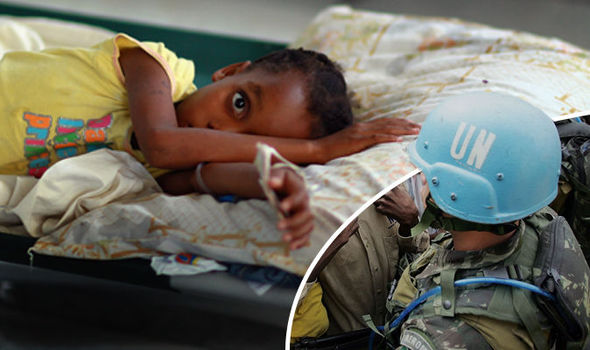-
Tips for becoming a good boxer - November 6, 2020
-
7 expert tips for making your hens night a memorable one - November 6, 2020
-
5 reasons to host your Christmas party on a cruise boat - November 6, 2020
-
What to do when you’re charged with a crime - November 6, 2020
-
Should you get one or multiple dogs? Here’s all you need to know - November 3, 2020
-
A Guide: How to Build Your Very Own Magic Mirror - February 14, 2019
-
Our Top Inspirational Baseball Stars - November 24, 2018
-
Five Tech Tools That Will Help You Turn Your Blog into a Business - November 24, 2018
-
How to Indulge on Vacation without Expanding Your Waist - November 9, 2018
-
5 Strategies for Businesses to Appeal to Today’s Increasingly Mobile-Crazed Customers - November 9, 2018
U.S. court says United Nations not liable for cholera outbreak in Haiti
The United Nations will give “material” aid to cholera victims in Haiti and their families, the secretary general’s spokesman said Friday, citing the global body’s “moral responsibility”.
Advertisement
Many suspected peacekeeping troops from Nepal brought the disease with them to Haiti after the January 2010 quake.
The statement was prompted by a decision handed down Thursday by the 2nd U.S. Circuit Court of Appeals in NY which upheld a lower court’s decision the United Nations can not be sued in U.S. courts.
Haq added that that the finding calls for a “significant new set of United Nations actions” and that a “new response will be presented publicly within the next two months”.
Mario Joseph, a Haitian human rights lawyer representing victims of the epidemic, told the Associated Press: “This is a major victory for the thousands of Haitians who have been marching for justice, writing to the United Nations and bringing the United Nations to court”.
The secretary-general noted there has been a 90 percent reduction in the number of cholera cases in Haiti since the peak of the outbreak in 2011 because of “sustained efforts by national authorities and the worldwide community”, the statement said. On Thursday, Haq reiterated that the UN’s legal position in claiming diplomatic immunity “has not changed”.
In this project, Shah compared the situation in Haiti to another devastating cholera outbreak almost two centuries earlier- Manhattan in the summer of 1832.
Speaking to reporters at a press briefing from United Nations headquarters in NY on Thursday, Farhan Haq said the United Nations.
“We will decide how to proceed based on whether the U.N.’s actions fulfill the cholera victims’ rights to an effective remedy”, Concannon said in a statement.
“This is a groundbreaking first step towards justice”, said Beatrice Lindstrom of the Institute for Justice and Democracy in Haiti (IJDH), which is pursuing a class-action lawsuit against the UN.
In a densely packed cluster of shacks where cholera flares up each year, residents who heard about the U.N.’s admission were hopeful they might get compensation.
Its May 2011 report concluded that while the cholera bacteria did not originate “from the native environs of Haiti”, the outbreak was “not the fault of, or deliberate action of, a group or individual”. Inadequately treated sewage water from a peacekeepers’ base reportedly contaminated Meille River, Haiti’s biggest water resource.
“We will continue to fight to get financial compensation for cholera victims, a formal public apology that victims are demanding and ensure the United Nations does much more to support water and sanitation efforts to eradicate cholera in Haiti”, Lindstrom said.
The secretary-general is urging all member states to show solidarity with the people of Haiti and increase their contributions to eliminate cholera and help those affected, Haq said.
According to the UN, Some 72 percent of Haitians have no toilets at home and 42 percent still lack access to drinking water.
A number of studies have found that the UN’s Nepalese peacekeepers, relocated to Haiti in the aftermath of the 7.0 magnitude quake, were the source of the outbreak.
Advertisement
“With a rainy season that will last through November or possibly December, we worry that cholera will be especially deadly this year, easily killing 400 or 500 people”. Less than a quarter of the $2.1 billion the U.N.is seeking has been raised so far, United Nations figures show.





























